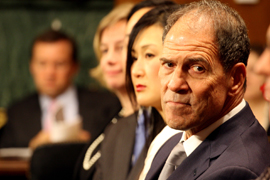Cronkite News has moved to a new home at cronkitenews.azpbs.org. Use this site to search archives from 2011 to May 2015. You can search the new site for current stories.
Arizona Supreme Court justice moves closer to federal judgeship
WASHINGTON _ The Senate Judiciary Committee confirmed Arizona Supreme Court Justice Andrew Hurwitz’s nomination to a federal appeals court Thursday, brushing aside concerns over his 2002 law review article on the Roe v. Wade abortion-rights ruling.
The 13-5 vote moves Hurwitz’s nomination to the full Senate, which has final say on his appointment to the 9th U.S. Circuit Court of Appeals.
Arizona Sen. Jon Kyl, who supported the nomination, said Thursday that the committee’s “overwhelming vote . . . will help to ensure that he (Hurwitz) will come up on the Senate floor in a timely fashion.”
Thursday’s hour-long committee meeting focused on an article in which Hurwitz pointed to opinions he drafted as a clerk for a federal district court judge, and their supposed influence on the Supreme Court’s controversial abortion decision.
Sen. Michael Lee, R-Utah, said Hurwitz’s self-promotion in the “deficient” Roe v. Wade opinion reflected poorly on his ability to be a 9th Circuit judge. He challenged the claim that the article did not express an opinion on the merits of Roe v. Wade.
“To anyone who has reviewed Mr. Hurwitz’s article and the laudatory tone with which it discusses that Supreme Court opinion, this response is simply not credible,” Lee said.
“Mr. Hurwitz . . . cannot seek credit for his role developing a jurisprudence that is completely unmoored from the Constitution, and that has fundamentally disrespected human life, and then later claim that he was only retelling a story as an outside observer,” Lee said.
But Kyl said he wholeheartedly supports Hurwitz’s nomination, pointing out his qualifications, temperament and intelligence, and noting that the judge has the support of Arizonans.
“If I believed that Justice Hurwitz had very firm anti-life views and if I believed that he could not differentiate between his own personal views and his responsibilities as a judge and would allow his own personal predilections to seep into his judicial decision-making, then I would not support it,” Kyl said. “But I don’t believe he’d do those two things.”
Kyl said fellow Arizona Sen. John McCain, who is not on the Judiciary Committee, also wholeheartedly supports the Hurwitz nomination.
Sen. Dianne Feinstein, D-Calif., called the law review article a “subordinate issue,” and she thanked Kyl for not letting it cloud Hurwitz’s achievements.
“I don’t think there is a more qualified person for the 9th Circuit anywhere,” Feinstein said.
Kyl said the nomination needs to move forward, because the federal appeals court desperately needs new judges. There are currently four vacancies on the 9th Circuit bench, according to the office of the circuit executive.
If appointed, Hurwitz would fill the seat of Judge Mary Schroeder, who retired at the end of 2011.
Stephen Dichter, a Phoenix-based attorney with Christian, Dichter and Sluga, agreed with Feinstein that the article should not be an issue because a circuit judge’s job is simply to apply the Constitution.
“As a 9th Circuit judge, he’s bound to enforce them (the laws) even though he may not personally believe in them,” Dichter said. “We’re a country of laws, not of men and women, and Roe v. Wade is the law of the country.
“Andrew Hurwitz is a fabulous lawyer and has been a fabulous justice on the Arizona Supreme Court,” Dichter said. “He’s a brilliant man.”
Hurwitz, nominated in November by President Barack Obama, has been a justice on the state Supreme Court since 2003. He has practiced law in Arizona since 1974, was a clerk for former U.S. Supreme Court Justice Potter Stewart and has been an adjunct professor at the Sandra Day O’Connor College of Law at Arizona State University.
He also served as chief of staff for former Arizona Govs. Bruce Babbitt and Rose Mofford.
Hurwitz, who faced only light questioning in a late-January nomination hearing, was not present for Thursday’s voting session.







